Open position: Employee (f/m/d) in science and teaching for the field of architecture (Material Library)
Tender Number: 1334/2025
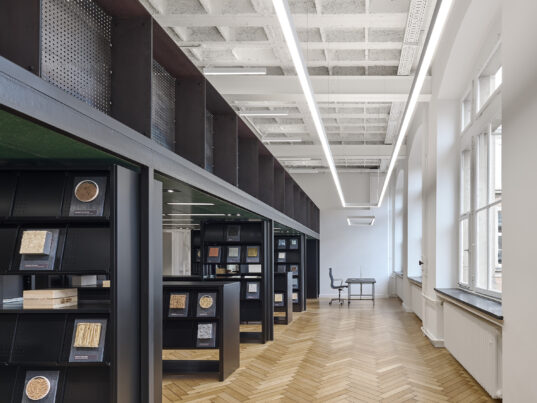
Organizational Unit: Institute IEB
Start Date: 1. February 2026
Scope of work: Part-time 50%
More information here.
Tender Number: 1334/2025

Organizational Unit: Institute IEB
Start Date: 1. February 2026
Scope of work: Part-time 50%
More information here.
Team MycoLab (Nazanin Saeidi, Karlsruhe Institute of Technology (KIT), Germany) was selected as one of the top 5 finalists for the prestigious Evergreen Prize 2025, sponsored by HS Timber Group and organized by the Evergreen Privatstiftung. Our project, “From Waste to Resource – Advancing Circular Bio-Based Materials for the Construction Industry,” was recognized by a distinguished jury of timber experts for its innovative approach and impact. During an exhilarating day of live presentations at the Vienna City Hall on 26 May 2025, witnessed by over 900 attendees from more than 50 countries, Team MycoLab advanced to the top 3, showcasing the global potential of circular, bio-based solutions in construction.
Team Mycolab was competing with Team BranchUP (Maximilian Pramreiter, University of Natural Resources and Life Sciences, Vienna (BOKU), Austria), Team Hyperlignification (Emil Engelund Thybring, University of Copenhagen, Denmark), Team Transparent Wood (Yuanyuan Li, KTH Royal Institute of Technology, Sweden) and Team LignoVolt (Ingo Burgert, ETH Zürich, Switzerland).
The live presentations took place at the Vienna City Hall. Team MycoLab advanced to the top 3, showcasing the global potential of circular, bio-based solutions in construction.
For more information watch the video about the team and their presentation here.
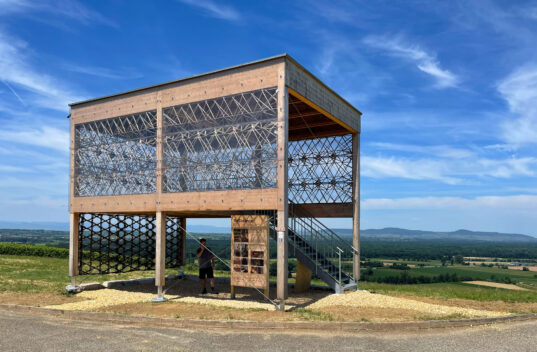
Two stories high and made from sustainable materials, the mobile research pavilion ‘Residence’ now stands in a prominent location on the Sommerberg in Ebringen. The pavilion – declared a shelter for hikers for planning reasons – was originally designed by the KIT Professorships Digital Design and Fabrication (DDF), Design of Structures (dos) and Sustainable Construction (NB) for the 2024 State Garden Show in Wangen im Allgäu to showcase the current state of sustainable construction. After the end of the show, it found its permanent home in Ebringen.
Text: Badische Zeitung, Thursday 10 July 2025
Find out more about the research project here.
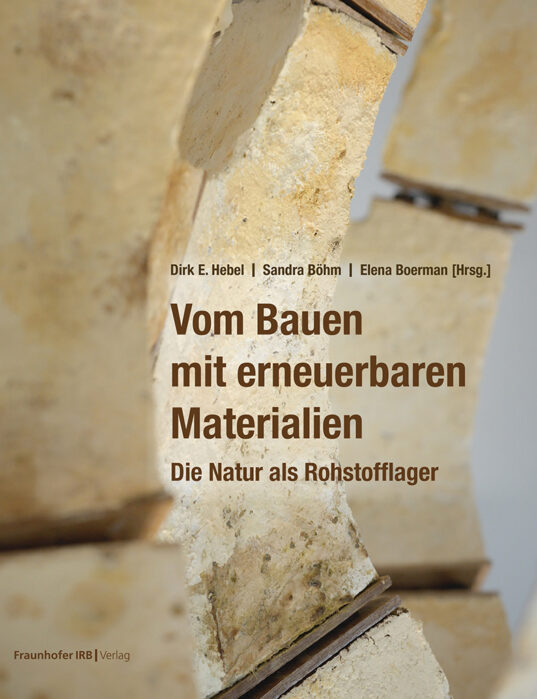
The editors of the nbau magazine write about the book: “Vom Bauen mit erneuerbaren Materialien is a whirlwind tour through the increasingly important world of the most important biological and geological building materials. Much is already possible today. At the same time, renewable materials seem to hold the promise of a climate-positive future for the construction industry based on a bio-based circular economy. In this sense, the book is both an overview and an appetiser.”
In the context of the Green Deal in Construction event, hosted by SIHGA in Gmunden, Austria, on 20 March 2025, Sandra Böhm and Elena Boerman gave a presentation on renewable materials and were interviewed by Thomas Hutzinger as part of the SIHGA TimberTalk series.
The interview focuses on necessary measures for resource-efficient and sustainable construction on the production and application side, areas of application for bio-based and innovative materials, and political and economic incentives to accelerate change in the construction industry.
Last week, the final reviews of Design Studio “HIRZBERG+ – Micro-Multifunctional Room for a Kindergarten in Freiburg” took place. Congratulations to all students!
The Haus für Kinder am Hirzberg in Freiburg is to be expanded to include a micro-multifunctional room due to a lack of space on its own property. This was the focus of the semester project and will be realised in cooperation with the Freiburg-based architecture office hotz + architekten. The room is to serve as a lounge and work space for employees, as well as a space for curative education activities and parent-teacher meetings. The design centred around a detailed examination of the environmental impacts, structural-economic, structural-technical and building-physical issues, as well as the use of resource-efficient, single-origin building materials such as renewable and secondary building materials, with sustainable, cycle-friendly construction methods and their design-technical effects on function and aesthetics, with planning up to a scale of 1:1.
Over the course of the winter semester, 8 groups of Bachelor’s and Master’s students approached these complex questions in a variety of ways. Since everyone has worked tirelessly on the project, we are very happy to give you an insight into the results. You can take a look at the diverse solutions since February 21 until March 6 in the exhibition at the KIT Faculty of Architecture in building 20.40 on the second floor.
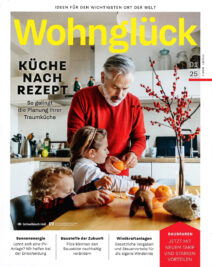
Merkert-Andreas, Carolin. “Pilze Sind Vielseitig.” Wohnglück, January 2025.

The KIT Material Library has been awarded the “Badischer Architektur Preis” (BDAP) in the Interior Design category for its innovative, circular concept. The renovation features materials that have already completed a life cycle, sourced from the so-called “urban mine”. All materials are sorted and installed without adhesives or silicones to maximize recyclability.

Manuel Rausch (STUDIO-MRA) was the lead architect of the Material Library. The design concept was developed in collaboration with the Material Library team, particularly the selection of materials for the interior was made with Professor Dirk E. Hebel, Sandra Böhm, Elena Boerman, and Thomas Kinsch.
With an extensive collection of building materials, the library offers students the chance to experience materials firsthand and integrate them into their design processes. The architectural redesign presents a bright, airy space with a gallery level that encourages interaction and exploration.
This material library serves as a knowledge repository for sustainable building materials, providing both analog and digital resources for research and education.

For more information, visit the BDAP website.
Micro-Multifunctional Room for a Kindergarten in Freiburg

The ‘Haus für Kinder am Hirzberg’ in Freiburg is characterised by its proximity to nature, built structures that have grown over time and space and an open room concept. In two existing buildings on a slope, which are connected by an intermediate building for access, the educational work of the team takes place in a homely atmosphere on different levels and always in close relation to the outdoors. The existing structure is complemented by a courtyard for the children to play in, which is protected by a small wooden tool shed facing the valley.
The kindergarten is now to be extended on its own site with a micro-multifunctional space, which is the focus of the semester assignment and which will subsequently be realised in cooperation with an architectural office based in Freiburg. The room will serve as a common and study room for staff as well as a room for curative education programmes and parent meetings. As the site is located within the “Roßkopf-Schloßberg” landscape conservation area, the preservation of the surrounding trees and copses as well as the protected wetland complex is an important design requirement. Particular importance is also attached to the spatial relationship between the existing buildings on the Hirzberg slope and the new spatial structure that is being created towards the valley, which should fit into the local landscape and provide a cosy atmosphere for the kindergarten staff.
The design is aiming for a detailed examination of the resulting environmental effects, building economics, structural engineering and building physics issues, as well as the use of resource-friendly, pure building materials such as renewable and secondary building materials, sustainable, circular construction methods and their design-related effects on function and aesthetics with planning up to a scale of 1:1.
Supervised by: Elena Boerman
First Meeting: 24.10.2024, 09.30 am (Bldg. 20.40, R 208)
Excursion: 15.11.2024, Freiburg
Pin-Up: 11.12.2024
Submission: 19.02.2025
Presentation: 21.02.2025
Form: Teamwork
Living on the food market in Kaiserslautern

How do people want to live together today and tomorrow? What are the prerequisites for good neighbourliness in an urban context? How can contemporary living models be reflected in residential buildings? How can a market promote cohesion and identity in a neighbourhood
While modernism proclaimed a separation of work and living, today innovative housing construction must develop offers for increasingly differentiated lifestyles. The focus of the task is therefore a forward-looking residential housing project that will be constructed in conjunction with commercial use on the ground floor on a plot in a heterogeneous neighbourhood in Kaiserslautern. The architectural designs should take into account the housing needs of people in the city as well as the respectful treatment of the surrounding context, resources and environment. The aim is to make design decisions for housing and the market comprehensible on the basis of successful reference projects, which will be analysed during the semester. For example, the design-integrated examination of housing requirements in the city of Kaiserslautern, different forms of human coexistence, contemporary housing developments, innovative concepts for food markets, circular construction methods and materials, resulting environmental impacts, building economics, structural engineering and building physics issues as well as the requirements of stakeholders and the needs of different users contribute to this.
The task is a mixed-use project consisting of residential and a food market in Kaiserslautern, which is currently being supervised by the Regensburg-based company RATISBONA Handelsimmobilien, a leading project developer in the German and international retail sector, and the architectural firm KURIARCHITEKTEN and will be further developed as a real project following the semester.
Supervision: Fanny Hirt, Han Jun Yi
When? Wednesdays and Thursdays in the Studio
First Meeting: 23.10.2024, 2.00 pm (Bldg. 11.40, R 027)
Pin-Up: 11.12.2024
Excursion: 04.11.2024, Kaiserslautern
Submission: 18.02.2025
Presentation: 20.02.2025

In the Winter Semester 2024/25, the KIT Department of Architecture will offer a lecture series on Sustainable Construction, organized by the Professorship of Sustainable Construction, Dirk E. Hebel. The lecture will address the history, state of the art, and alternative futures within the theme. Please refer to the poster for speakers and actual dates. The lecture is held every Wednesday, 9.45 am in the lecture hall Fritz-Haller in the building 20.40 at KIT Campus South.
Poster Design: Uta Bogenrieder

In the Winter Semester 2024/25, the KIT Department of Architecture will offer a lecture series on Materials, organized by the chair of Sustainable Construction, Dirk E. Hebel. The lectures will address conventional and alternative building materials and their use in construction. Please refer to the poster for speakers and actual dates. The lecture is held every Friday, 9.45 am at the lecture hall Fritz-Haller in the building 20.40 at KIT Campus South.
Poster Design: Uta Bogenrieder
Nazanin Saeidi in an interview with Maike Rubel and Patricia Leuchtenberger about the innovative manufacturing process and the advantages of NEWood as a recyclable alternative to wooden composite materials.
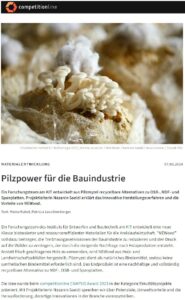
Rubel, Maike, and Patricia Leuchtenberger. Interview: “Pilzpower für die Bauindustrie.” competitionline, 7 June 2024, https://www.competitionline.com/de/news/schwerpunkt/pilzpower-fuer-die-bauindustrie-7283.html.
On 24 April 2024 at 6 pm, the UMSA shortlist was announced at the Haspel campus in lecture theatre 00.01. All participants of the competition, the supervising university teachers and relatives were invited to this event.
The event was broadcast online and KIT organised a public viewing for and with the students. Three out of six people on the shortlist have developed a design for the old lace factory in Wuppertal at KIT in the winter semester 2023/24: We warmly congratulate Nils Benkeser, Frederik Busch and Maximilian Weiß.
The official award ceremony with the announcement of the winners will take place on 3 May 2024 at 5 pm at the Schwebodrom Wuppertal (Werth 96, 42275 Wuppertal). Guests at the award ceremony will be greeted with welcome drinks and canapés. Afterwards, all visitors will be offered a VR tour of the Schwebodrom. The official award ceremony will begin at around 6 p.m. with the announcement of the winners, after which the winners will be invited to a dinner together at the Cafe Schimmerlos event location (Friedrich-Ebert-Straße 85, 42103 Wuppertal).
Redensification concepts for Würzburg-Gartenstadt
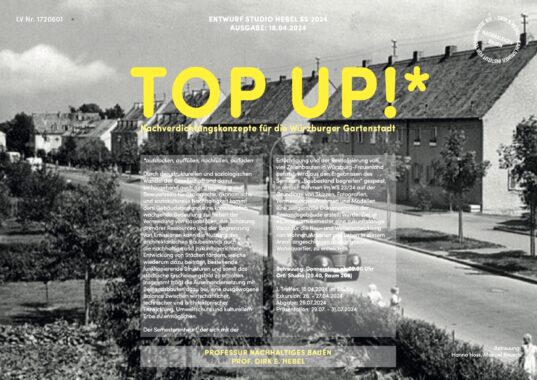
*to add, to fill, to refill, to recharge
Due to the structural and sociological changes in society and the associated increase in awareness of ecological, economic and socio-cultural sustainability, existing buildings are becoming increasingly important. In addition to avoiding construction waste, conserving primary resources and limiting emissions, the use of existing architectural buildings can also promote the sustainable and future-oriented development of cities, which in turn helps to preserve existing functioning structures and thus the urban appearance. Overall, dealing with existing buildings helps to achieve a balance between economic, technical and architectural development, environmental protection and cultural heritage.
The semester design, which deals with the refurbishment and revitalization of four row buildings in Würzburg-Frauenland, is fed by the results of the seminar “Understanding existing buildings”, in which a contemporary documentation of the existing buildings was created in WS 23/24 on the basis of sketches, photographs, surveys and models. The aim of this semester is to develop a sustainable vision for the new and further development of living, working and living in this area, connected to the entire residential neighbourhood.
Supervised by: Hanna Hoss, Manuel Rausch
Supervision: Wednesday afternoons, Thursdays
Location: Studio (20.40, room 208)
1st meeting: 18.04.2024 in our studio
Excursion: 26. – 27.04.2024
Submission: 26.07.2024, 12.00
Presentation: 30.07.2024 and 31.07.2024
A Research Seminar of the KIT Material Library
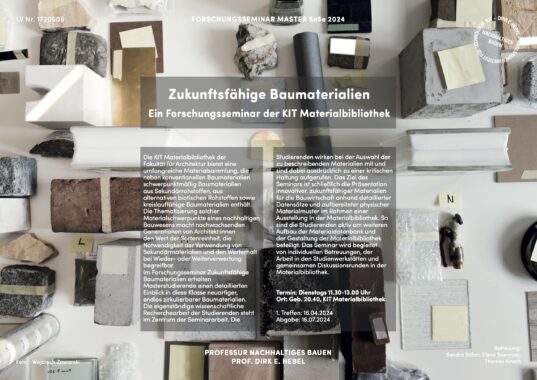
The KIT Materials Library of the Faculty of Architecture offers an extensive collection of materials that, in addition to conventional building materials, focuses on building materials made from secondary raw materials, alternative biotic raw materials and recyclable building materials.
Addressing such material focal points of sustainable construction makes future generations of architects understand the value of varietal purity, the necessity of using secondary materials and the preservation of value when reused or recycled.
In the research seminar Future-oriented Building Materials, Master’s students gain a detailed insight into this class of innovative, endlessly recyclable building materials. The independent scientific research work of the students is at the heart of the seminar work. The students are involved in the selection of the materials to be described and are explicitly called upon to adopt a critical stance. The final aim of the seminar is to present innovative, sustainable materials for the construction industry using detailed data sheets and prepared physical material samples as part of an exhibition in the materials library. Students are thus actively involved in the further development of the materials database and the collection of the materials library. The seminar is accompanied by individual supervision, work in the study workshops and joint discussion rounds in the materials library.
Supervised by: Sandra Böhm, Elena Boerman
Date: Tuesdays 11.30-13.00
Location: KIT Material Library, 20.40, Room 141
1st meeting: 16.04.2024
Exam: 16.07.2024
A journey across the Alpine region
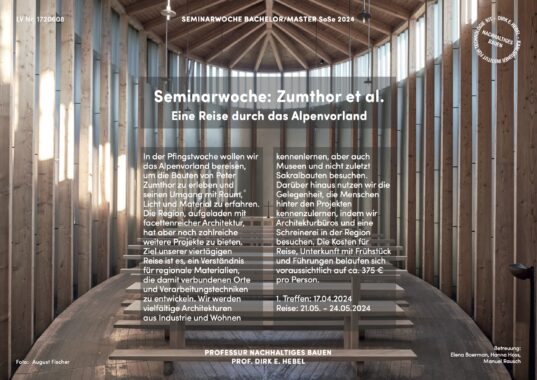
During Whitsun week, we want to travel to the Alpine foreland to experience Peter Zumthor’s buildings and his work with space, light and material. The region, rich in diverse architecture, has numerous other projects to offer. Our aim during the four days of our trip is to develop an understanding of regional materials, the places associated with them and processing technologies.
We will get to know multifaceted industrial and residential architecture, but also visit museums and, last but not least, religious buildings. In addition, we will take the opportunity to meet the people behind the architecture by visiting architectural offices and a carpentry workshop in the region.
The cost for travel, accommodation with breakfast and programme is estimated at around €375 per person.
Supervised by: Prof. Dirk E. Hebel, Elena Boerman, Hanna Hoss, Manuel Rausch
First Meeting: 17.04.24, 11.30 am, building 11.40, Raum 26
Excursion: 21.05.2024 – 24.05.2024
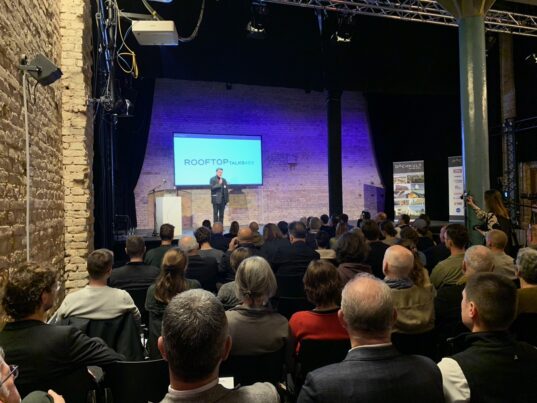
The federal and state governments have agreed on a “construction turbo pact” to speed up planning and approval processes. Industrial production methods should make building cheaper and approval procedures faster: “In order to further promote this form of building, the federal states will regulate that once type approvals for serial, modular and systemic construction have been granted, they will be valid nationwide,” writes the Federal Building Ministry BMBSW. An occasion for the initiative Dachkult to take a look at outstanding architecture that is modularly planned right up to the roof.
The event took place on March 21st in the Kulturzentrum Tempel in Karlsruhe. The Heilbronn office of Joos Keller Architekten has won the Hugo Häring Prize with its modularly designed Bernhäusle children’s garden – Thomas Heyd, Managing Director of Zimmerei Heyd, took a look behind the scenes of production. The KIT team led by Prof Dirk E. Hebel has won the Solar Decathlon Europe with a modularly developed roof extension – Elena Boerman, Researcher/Sustainable Construction at KIT Karls- ruhe presents the design and process. The winners of the Dachwelten 2023 competition from Würzburg Schweinfurt University of Applied Sciences also impressed with a modular roof extension.
In addition to speed and cost certainty, modular construction offers another advantage: circularity – a requirement for which the pitched roof is particularly suitable in its basic structure.
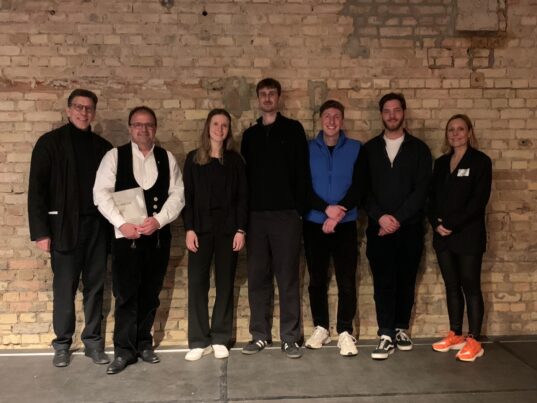
Click here to see more impressions and videos of the event soon.
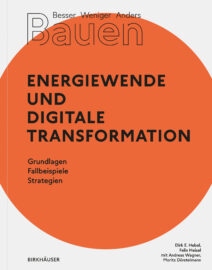
Hebel, Dirk E., Felix Heisel, Andreas Wagner, und Moritz Dörstelmann, Hrsg. Besser Weniger Anders Bauen – Energiewende und digitale Transformation. Besser Weniger Anders Bauen 2. Basel: Birkhäuser Verlag GmbH, 2023.
Contemporary living in the historic Henkels lace factory in Wuppertal
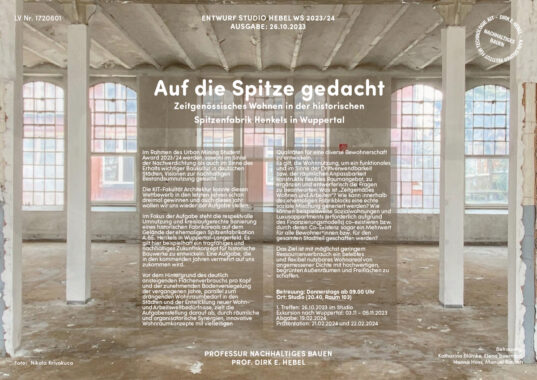
As part of the Urban Mining Student Award 2023/24, visions for the sustainable use of existing buildings are being sought, both in the sense of redensification and in the sense of preserving important building culture in German cities. The KIT Faculty of Architecture has already won this competition three times in recent years and this year we want to take on the task again.
The focus of the task is the respectful conversion and cycle-compatible redevelopment of a historic factory site on the grounds of the former lace factory A.&E. Henkels in Wuppertal-Langerfeld. The task here is to develop an exemplary, viable and sustainable future concept for historic buildings. This is a task that will increasingly face us in the coming years.
Against the background of the significant increase in land consumption per capita and the increasing soil sealing of recent years, parallel to the urgent need for housing in the cities and the development of new living and working environment requirements, the task aims to develop innovative housing concepts with versatile qualities for a diverse population through spatial and organisational synergies.
The aim is to complement the residential use with a functional and constructively flexible range of spaces that can be used by third parties or adapted spatially, and to answer the design questions: What is “contemporary living and working”? How can a real social mix be generated within the former factory block? How can, for example, social housing and luxury apartments (necessary due to the financing model) co-exist or even create added value for all residents or for the entire district through their co-existence? The goal is to create a lively and flexibly usable residential area of appropriate density with high-quality, greened outdoor spaces and open spaces using as few resources as possible.
Supervised by: Katharina Blümke, Elena Boerman, Hanna Hoss, Manuel Rausch
Supervision: Wednesday afternoons, Thursdays
Location: Studio (20.40, room 103)
1st meeting: 26.10.2023 in our studio
Excursion to Wuppertal: 03.11 – 05.11.2023
Submission: 16.02.2024, 12.00
Presentation: 21.02.2024 and 22.02.2024
Research Seminar / Sustainable Construction
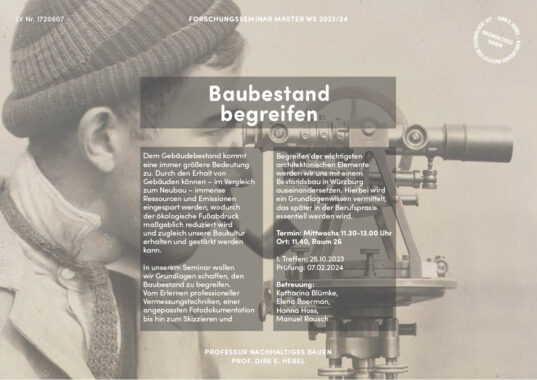
The building stock is becoming increasingly important. Through the preservation of buildings – compared to new construction – immense resources and emissions can be saved, which significantly reduces the ecological footprint and at the same time preserves and strengthens our building culture.
In our seminar we want to lay the basics for understanding the existing building stock. From learning professional measuring techniques and adapted photo documentation to sketching and understanding the most important architectural elements, we will look at an existing building in Würzburg. In the process, a basic knowledge is taught that will later become essential in professional practice.
Supervised by: Katharina Blümke, Elena Boerman, Hanna Hoss, Manuel Rausch
Date: Wednesdays 11.30-13.00
Location: 11.40, Room 26
1st meeting: 25.10.2023
Exam: 07.02.2024


Sustainability is to become the guiding principle of social action and economic activity. At the same time, its ways and means are far from clear. As a holistic praxis, sustainability must combine technical and material as well as social, economic, ecological and also ethical strategies, which have multiple complex interactions and all too often also conflicting goals and priorities. In no other field can these be better observed, addressed and influenced than in architecture and building.
Each volume of “Building Better – Less – Different” details two fundamental areas of sustainability and explores their specific dynamics and interactions. After introductory overviews, innovative methods and current developments are described and analysed in in-depth essays, international case studies and pointed commentaries. The sustainability criteria of efficiency (“better”), sufficiency (“less”) and consistency (“different”) form the framework for each book.
The clean energy transition and digital transformation are essential components of a fundamental shift towards circular construction with significantly lower impacts on the environment and climate. Building design and construction measures become part of a holistic energy concept spanning the entire life cycle. Digital construction technologies offer a means of reinterpreting natural building materials. The mass customization of tailor-made building components minimizes resource consumption. These form the foundations for a profound transformation of the architecture, construction and engineering industries.
Editors: Dirk E. Hebel, Felix Heisel with Andreas Wagner, Moritz Dörstelmann
Will AI soon be building our houses? Artificial intelligence is also taking the architecture industry by storm. The internet is full of AI-generated fantasy architecture. Software generates images of houses and interiors from text commands that are real eye-catchers. And they do it in a matter of seconds. So will we soon no longer need architects? Or will AI become a useful tool?
Under the editorship of Anette Plomin, Prof. Dirk E. Hebel and other players in the construction industry are confronted with the issues of AI. Prof. Hebel sees the alternative in construction not primarily in AI, but in the recycling of building materials. In Zurich, he uses the Urban Mining and Recycling Unit to show what a flat could look like that is completely recyclable and compostable. He can also well imagine using AI to better manage building materials and resources in the future, but for him it is clear that only humans can initiate the great processes of change in terms of sustainable and future-oriented building.
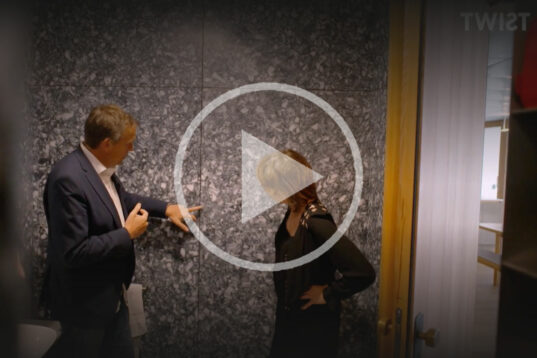
Daniela Schneider, doctoral student at the KIT Sustainable Building Professorship, will be taking part in an online panel discussion on the topic of “Cycle-efficient timber building system solutions” at the themed afternoons on timber construction organised by the Agency for Renewable Resources (FNR) on 15 November 2023.
More information about the event here.
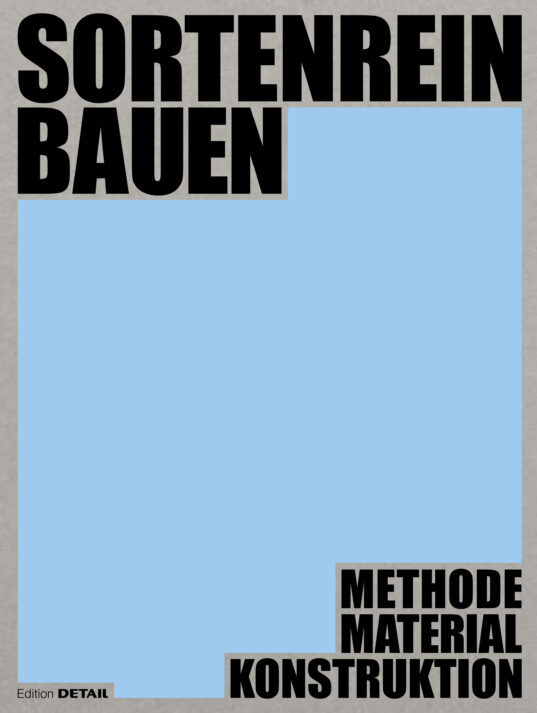
Full landfills, ambitious climate targets: By 2050, the European Union wants to introduce a comprehensive circular economy. For the turnaround in construction to succeed, material resources must be fully reused and recycled. Pure and low-polluting building materials that are used in reversible component connections and are simply joined are the basic prerequisite for the circular construction of buildings. This handbook explains how to design and build according to the closed-loop principle. It shows the history and present of cycle-oriented architecture and analyses the basics of single-variety construction with regard to methodology, materials and construction. Joining and connecting techniques are discussed as well as the choice of materials in general and the life cycles of individual layers and their functions. The extensive detailed catalogue with drawings on a scale of 1:20 documents exemplary applications and connections, which are differentiated according to materials.
Editors: Dirk E. Hebel, Ludwig Wappner, Katharina Blümke, Steffen Bytomski, Valerio Calavetta, Lisa Häberle, Peter Hoffmann, Paula Holtmann, Hanna Hoss, Daniel Lenz, Falk Schneemann
Due to the worldwide concrete boom, the granular raw material is becoming scarce. In an interview with Clemens Dörrenberg of the Frankfurter Rundschau, Prof. Dirk E. Hebel talks about the overexploitation of an embattled resource and how it could be replaced in construction. The article appeared in the FR7 magazine of the Frankfurter Rundschau on 23/24 September 2023.
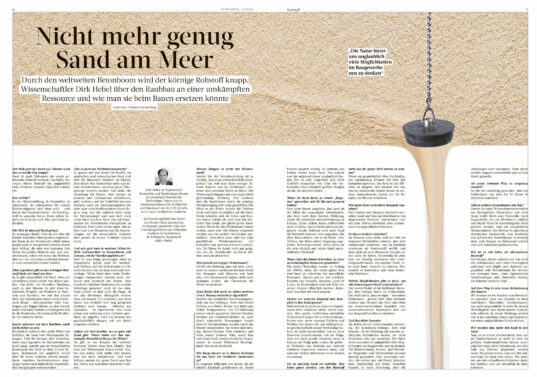
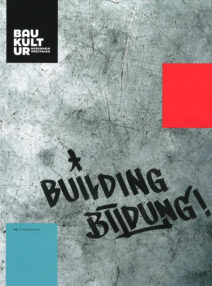
Hebel, Dirk E. “Vom Jagen, Züchten Und Ernten Zukünftiger Baumaterialien.” Baukultur Nordrhein Westfalen, September 2023.
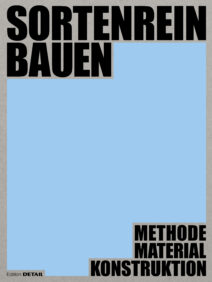
Hebel, Dirk E., Ludwig Wappner, Katharina Blümke, Valerio Calavetta, Steffen Bytomski, Lisa Häberle, Peter Hoffmann, Paula Holtmann, Hanna Hoss, Daniel Lenz and Falk Schneemann, eds. Sortenrein Bauen – Methode Material Konstruktion. Edition DETAIL. München: DETAIL Business Information GmbH, 2023.
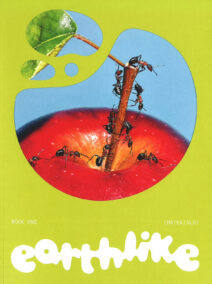
Schweikle, Johannes. “Fungi.” In Earthlike, 1:70–75, 2023.
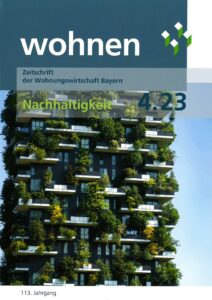
Hebel, Dirk E. “Die Stadt als Rohstofflager.” wohnen – Zeitschrift der Wohnungswirtschaft Bayern, August 2023.
Hebel, Dirk E. “Das RoofKIT-Gebäude der KIT Fakultät für Architektur – Gewinner des Solar Decathlon 2021/22 in Wuppertal.” wohnen – Zeitschrift der Wohnungswirtschaft Bayern, August 2023.
Monday, October 9th, 2023
8:30 – 18:30 (CET)
Open Space 2 – Institute of Technology in Architecture (ITA ETH Hoenggerberg)
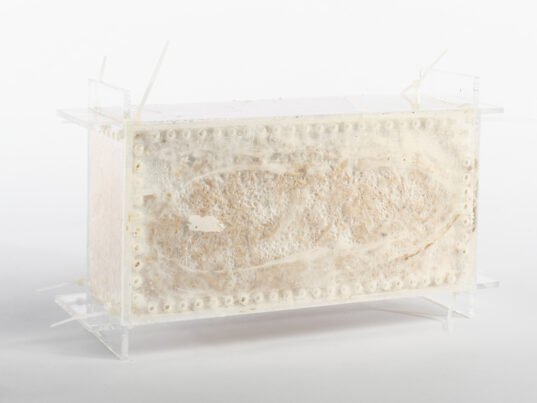
The one-day symposium is part of our work in the Future Cities Lab (FCL) research programme.
The event is being organized by the Block Research Group (ETH) and the chair of Digital Building Technologies (ETH), in collaboration with the chairs of Prof. Hortense Le Ferrand from NTU Singapore and Prof. Dirk Hebel from KIT Karlsruhe, with support from the Institute of Technology in Architecture (ITA) and ALIVE, and Holcim Foundation.
Our module BIO – Urban Biocycles Mycelium Digitalisation brings together researchers from the Block Research Group (ETH), the chair of Digital Building Technologies (ETH), Singapore (NTU), and Karlsruhe (KIT) to develop, utilize, and assess mycelium-bound composite materials in building construction.
This event aims to inspire new conversations regarding circularity in architecture and gauge the barriers and opportunities in utilizing bio-materials, with a focus on mycelium-based materials.
Each panel proposes a mix of experts in order to provide perspective on the industry and on the challenges and opportunities in utilizing mycelium-based materials in building construction and architectural applications.
Please register now for our event – Registration, Lineup, and Schedule here: BIOFRONTIERS
The KIT Materials Library houses an extensive collection of material samples, whose haptic experience and critical assessment are of particular importance for the education of architects in our view. It offers the opportunity to learn about both established, well-known and new, innovative materials and technologies.
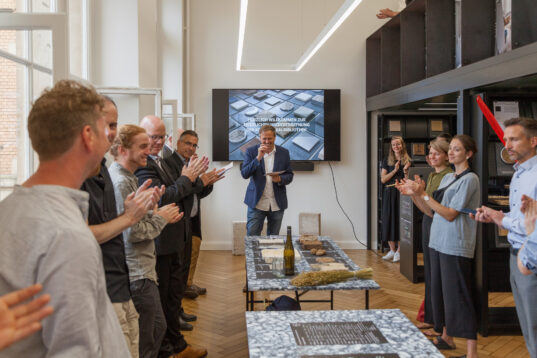
The extensive physical collection of material samples – and in the future also associated digital data sets – not only serves to deepen and illustrate the teaching of materials at the faculty, but also provides students with valuable assistance for working on exercises and in the design process. The material samples can be borrowed and used by students in the context of project developments and presentations.
During an evening event on 18 July 2023, the KIT Materials Library was finally ceremoniously reopened after a phase of restructuring and reconstruction. Prof. Dr. Alexander Wanner, KIT Vice President Teaching and Academic Affairs, Prof. Dr. Johannes Orphal, KIT Head of Natural and Built Environment, and Dr. Theo Mayer, Vice President R&D & Innovation Polymers, representing Wacker Chemie AG as sponsor, were invited as greeters. In addition, professors, employees and students of the KIT Faculty of Architecture, employees and responsible persons of some other KIT libraries as well as representatives of other universities, the Chamber of Architects and the manufacturing companies and sponsors of material samples took part in the event.
The KIT Materials Library is a central facility at the KIT Faculty of Architecture and is supervised by Sandra Böhm and Elena Boerman from the Sustainable Building Professorship (Prof. Dirk E. Hebel) and Thomas Kinsch.
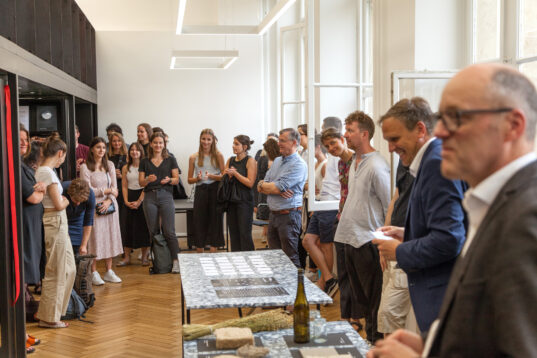
In the KIT Materials Library, a special focus is placed on building materials that either originate from local availability or local production, that can be composted in the biological cycle or recycled in the technical cycle without loss of quality, or that consist of secondary, reused or recycled raw materials of the anthropogenic stock. These thematic focuses on important questions of the 21st century make the KIT Materials Library an international focal point for targeted research and teaching.
The Materials Library is intended to function as a vessel for knowledge storage and knowledge transfer regarding innovative building materials for the present and the future, in order to educate the new generation of visionary and interested young people who are able to think transdisciplinarily and scientifically and to act sustainably.
Within the framework of the cooperation “Material Library of German Universities MDH”, which currently already includes the Bergische Universität Wuppertal and the Münster School of Architecture and whose network will be expanded in the future to include other universities and colleges, the digital component to the material library, the material database, is being developed. This database will be set up, filled and maintained in cooperation with the other universities. In the future, it will also be openly accessible on the website of the KIT Materials Library and contain extensive data sets on the material samples of the Materials Library’s inventory.
Changing exhibitions in the KIT Materials Library provide information on specific topics, such as natural insulating materials, native wood species or recyclable materials. Student work from the subject of materials science (Bachelor’s degree) as well as from materials-specific research seminars (Master’s degree) is firmly integrated into the materials library, both digitally and physically. The students themselves are thus actively involved in expanding the materials library.
The premises of the KIT Materials Library can be used for seminars, workshops and lectures. In addition, there are three open workstations for students in the library gallery, which can be used for further research.
As a central facility of the KIT Faculty of Architecture, the KIT Materialbiblitohek helps our students to critically and intensively deal with the goals and challenges, with the present and the future of construction.
More information about the KIT Materials Library here.
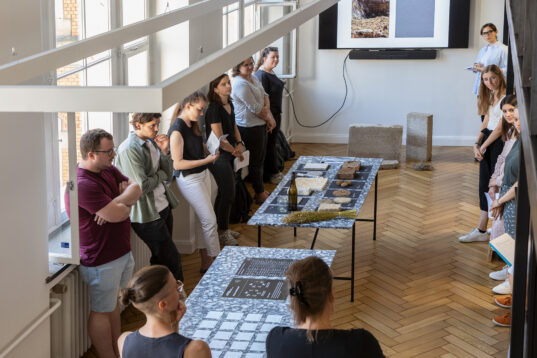
On 18 July 2023, the day the KIT Materials Library reopened, the first event in the new premises already took place with the final presentation of the research seminar “Future-Oriented Materials”.
The students had worked intensively in groups on five materials each, so that they actively contributed to the material library through their research and also gained insights into the work in the backend of the material database. In addition, there were exciting input lectures and even a workshop in which the material hemp-lime was worked with. The result of the seminar was 30 material data sets, which will be fed into the future cooperatively operated database not only at KIT but also within the Germany-wide cooperation of the “Material Library of German Universities MDH”.
In addition, the students designed an exhibition that contains material samples and data sheets as well as the appropriate raw materials for the materials, a self-designed game and further material comparisons.
We are very happy about this very good work in the seminar and the high commitment of the students. The exhibition described can now be visited in the KIT Material Library.
A large hands-on exhibition on new (and old) building materials is located in a warehouse in the future Backnang-West neighborhood: programmed wood, insulation made from old clothes, concrete foam. Selected exhibits from research and industry are on display. The focus is on various materials and their further development.
There is also an exhibition contribution from the KIT Faculty of Architecture, which consists of a documentation of the RoofKIT project and an excerpt from the material library. Among others, the University of Stuttgart, ILEK/ITKE/Biomat, FRA UAS Frankfurt and selected industrial partners are also involved.
The exhibition is open from 07.07. to 22.07 always on Thursdays and Fridays from 14 to 19 clock and Saturdays from 10 to 15 clock. All interested parties are cordially invited.
On the evening of 07.07. the exhibition opening took place with a Science Night including a short presentation of all exhibits by the exhibitors. Elena Boerman, research associate at the Chair of Sustainable Construction, presented the KIT contribution to an interested audience.
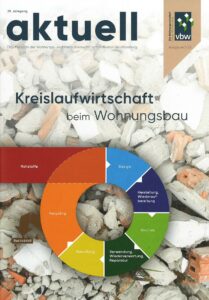
Hebel, Dirk E. “Die Stadt Als Rohstofflager.” Aktuell – Das Magazin Der Wohnung- Und Immobilienwirtschaft in Baden-Württemberg, 2023.
24.09.023 – 01.10.2023
Workshop week as part of the 18th Architecture Biennale in Venice
Take advantage of this great opportunity not only to experience Venice and the Architecture Biennale, but also to expand your network, meet international students and architects and develop your creative skills.
In cooperation with KOEN Institute of TU Graz and Baukreisel e.V. (Collective for Transformation and Design) Supervised by: Barbara Gruber, Jonas Läufer
Participants: 10 persons (TU Graz) + 10 persons (KIT)
Costs: € 200 (including accommodation, entrance fees and documentation, individual travel)
Accommodation: Laboratori occupato Morion, Calle de Morino
Registration by mail: info@baukreisel.org
INFO MEETING FOR THE WORKSHOP: 20.07.2023 in the left inner courtyard of the faculty.
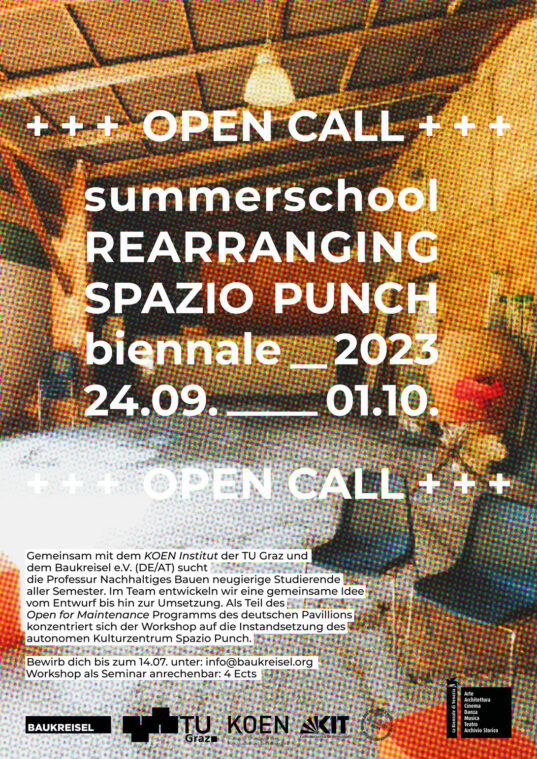
The German contribution to this year’s 18th Architecture Biennale 2023 is dedicated to the themes of care, maintenance and repair entitled “Open for Maintanance_Wegen Umbau geschlossen”. This year, the German Pavilion is transforming into a productive infrastructure that promotes the principles of circular construction as well as the social responsibility of architecture. It serves to collect, catalogue, provide and process used materials from the previous Art Biennale. A workshop set up in the German Pavilion forms the working environment for various Venetian and international initiatives and universities that work with interventions to preserve and maintain socio-spatial structures on site.
Together with the KOEN Institute, the Graz University of Technology and the Baukreisel Association (Collective for Transformation and Design), we are organising a workshop week as part of the 1:1 Maintenance Programme to plan and implement an intervention. Together with the Venetian cooperative Spazio Punch, whose alternative exhibition space and creative meeting place is located on the island of Giudecca, we will design and maintain the place with small repairs and additions. We will have a fully equipped workshop and materials store at our service in the German Pavilion at the Biennale site.
The material collected from contributions to the past Art Biennale as well as the material stocks of Spazio Punch serve as a basis. The intention is to work on the existing material with small interventions and to create new details.
One of the many networks initiated by the curatorial team of the German Pavilion is the cooperation with Laboratori occupato Morion. They are making their building, not far from the Giardini, available to all participants as group accommodation.
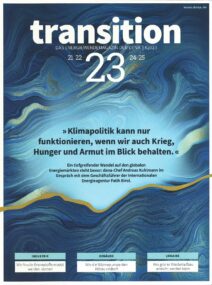
Ellinghaus, Tanja. “Bau-Kreislauf Statt Einweg-Wirtschaft.” Transition – Das Energiewendemagazin Der Dena, 2023.
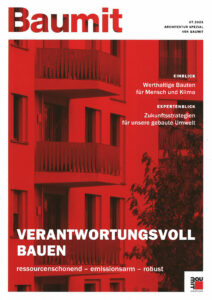
Hebel, Dirk E. “Sortenreines Konstruieren – Kreislaufbasiertes Selbstverständnis in der Architektur.” Baumit, 2023. https://www.calameo.com/read/0011023184a57c4715124.
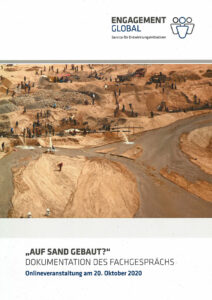
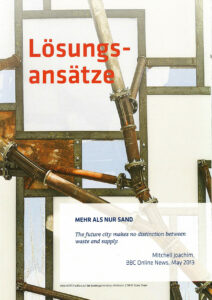
Reddy, Anita. “Bauen Als Kreislaufprojekt.” Engagement Global GGmbH, October 20, 2020. https://www.faz.net/aktuell/rhein-main/frankfurt/frankfurt-setzt-auf-recycling-nach-abriss-stadt-wird-baustofflager-18707619.html.
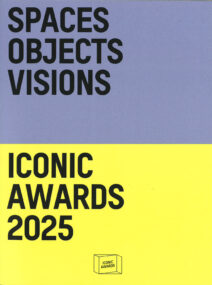
Dietzold, Lutz, ed. Iconic Awards 2025 – Spaces Objects Visions. Frankfurt: Rat für Formgebung GmbH, 2025.
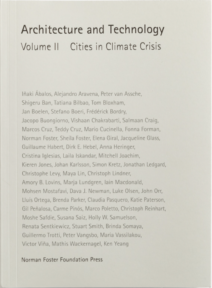
Hebel, Dirk E. “Activating the Urban Mine.“ In Architecture and Technology Volume II: Cities in Climate Crisis. Madrid: Norman Foster Foundation Press, 2025.

Hebel, Dirk E. und Felix Heisel. “Die Stadt als Ressource.” In Für eine nachhaltige Architektur der Stadt. Berlin: Verlag Klaus Wagenbach, 2025.
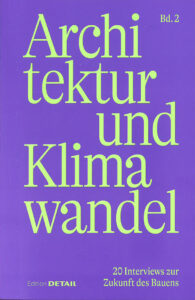
Hebel, Dirk E. “Vom Linearen Zum Kreislaufsystem.” In Architektur Und Klimawandel. München: Edition DETAIL, 2025.
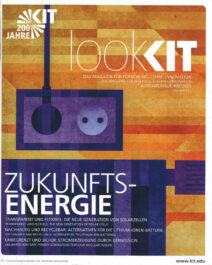
Hebel, Dirk E. Interview: “Wir müssen endlich anfangen, den CO2-Ausstoß zu messen – nicht nur, wie dick die Dämmung ist.” Interview by Christoph Karcher. LooKIT 0225, 2025.
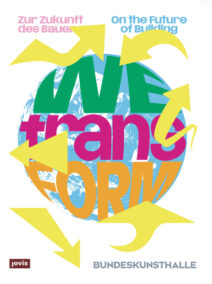
BUNDESKUNSTHALLE, ed. WEtransFORM – Zur Zukunft Des Bauens. Berlin: jovis Verlag, 2025.
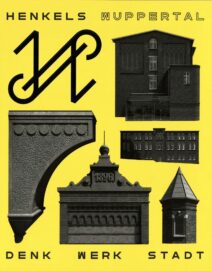
Renaissance AG, ed. Henkels Wuppertal – DenkWerkStadt. Wuppertal: renaissance Immobilien und Beteiligungen Aktiengesellschaft, 2025.
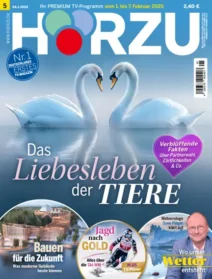
Monkenbusch, Helmut. „Bauen für die Welt von morgen.“ Hörzu, 24.1.2025
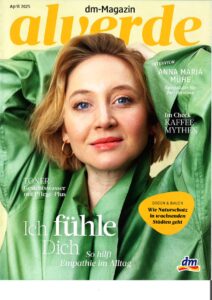
Hebel, Dirk E., Tanja Hildbrandt. „ Pilze – Netzwerker im Untergrund“. alverde, dm-Magazin, April 2025.

Merkert-Andreas, Carolin. “Pilze Sind Vielseitig.” Wohnglück, January 2025.
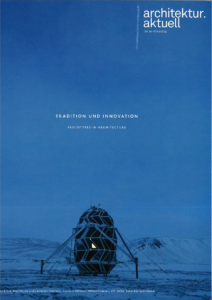
Boerman, Elena, and Dirk E. Hebel. “RoofKIT – Kohlenstoffspeicher Und Materiallager.” Architektur.Aktuell, vol. 12.2024, no. Tradition und Innovation, Dezember 2024, pp. 98–109

Hebel, Dirk E. Interview: “Vom linearen zum zirkulären Kreislaufsystem.” Interview by Sandra Hofmeister, DETAIL 11.2024, Nov. 2024.

Hebel, Dirk E., Sandra Böhm, Elena Boerman, Hrsg. Vom Bauen mit erneuerbaren Materialien – Die Natur als Rohstofflager. Stuttgart: Fraunhofer IRB Verlag, 2024.
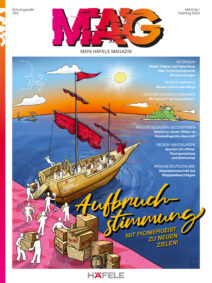
Hebel, Dirk E. “In Kreisläufen denken, entwerfen und wirtschaften.” MÄG – Mein Häfele Magazin, 2024.

Rubel, Maike, and Patricia Leuchtenberger. Interview: “Pilzpower für die Bauindustrie.” competitionline, 7 June 2024, https://www.competitionline.com/de/news/schwerpunkt/pilzpower-fuer-die-bauindustrie-7283.html.
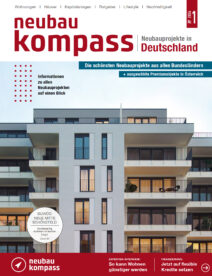
Müller, Janek. “Baumaterialien der Zukunft: Pilze, Hanf und Algen.” neubau kompass – Neubauprojekte in Deutschland, May 3, 2024. https://www.neubaukompass.de/premium-magazin/.
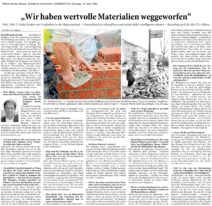
Sören, S. Sgries. “Interview: ‘Wir haben wertvolle Materialien weggeworfen.’” Rhein-Neckar-Zeitung, April 27, 2024, SÜDWEST I 28 edition, sec. Sinsheimer Nachrichten.

Schweikle, Johannes. “Auf Pilz gebaut.” Stuttgarter Zeitung, April 23, 2024, sec. Die Reportage.
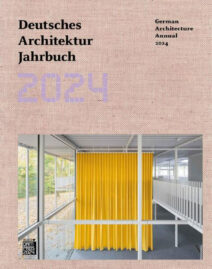
Klaaßen, Lars. “Organische Architektur – Pilzmyzel und Flachs als Materialien für die ökologische Bauwende.” In Deutsches Architektur Jahrbuch 2024, edited by Peter Cachola Schmal, Yorck Förster, and Christina Gräwe, 198–209. Berlin, Germany: DOM publishers, 2024.
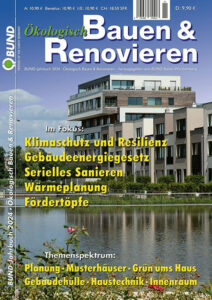
Streiff, Peter. “Zirkuläres Bauen – Kreislauf statt Abriss.” BUND-Jahrbuch – Ökologisch Bauen & Renovieren 2024, January 2024.
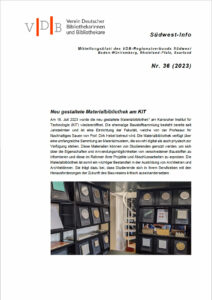
Mönnich, Michael, and Sandra Böhm. “Neu gestaltete Materialbibliothek am KIT.” Südwest-Info: Mitteilungsblatt des VDB-Regionalverbands Südwest Nr. 36 (2023), 2023.
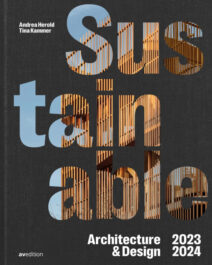
Hebel, Dirk E. “RoofKIT Wuppertal, Germany; Interview with Prof. Dirk Hebel: The aim is clear, we must forge the path ourselves.” In Sustainable Architecture & Design 2023/ 2024, edited by Andrea Herold, Tina Kammerer, and InteriorPark., 46–55. Stuttgart, Germany: av edition GmbH, 2023.
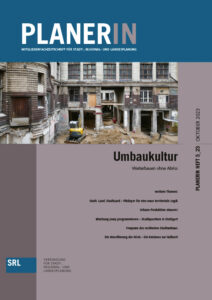
Hebel, Dirk E. “Der Bestand ist die künftige Ressource – Den linearen Umgang mit Baumaterialien schnellstmöglich stoppen.” Planerin – Mitgliederfachzeitschrift für Stadt-, Regional- und Landesplanung, Oktober 2023.
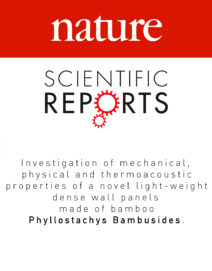
Gholizadeh, Parham, Hamid Zarea Hosseinabadi, Dirk E. Hebel, and Alireza Javadian. “Investigation of Mechanical, Physical and Thermoacoustic Properties of a Novel Light-Weight Dense Wall Panels Made of Bamboo Phyllostachys Bambusides.” Nature Sientific Reports 13 (October 26, 2023). https://doi.org/https://doi.org/10.1038/s41598-023-45515-3

Hebel, Dirk E., Felix Heisel, Andreas Wagner, und Moritz Dörstelmann, Hrsg. Besser Weniger Anders Bauen – Energiewende und digitale Transformation. Besser Weniger Anders Bauen 2. Basel: Birkhäuser Verlag GmbH, 2023.

Hebel, Dirk E. “Vom Jagen, Züchten Und Ernten Zukünftiger Baumaterialien.” Baukultur Nordrhein Westfalen, September 2023.

Hebel, Dirk E., Ludwig Wappner, Katharina Blümke, Valerio Calavetta, Steffen Bytomski, Lisa Häberle, Peter Hoffmann, Paula Holtmann, Hanna Hoss, Daniel Lenz and Falk Schneemann, eds. Sortenrein Bauen – Methode Material Konstruktion. Edition DETAIL. München: DETAIL Business Information GmbH, 2023.

Schweikle, Johannes. “Fungi.” In Earthlike, 1:70–75, 2023.

Hebel, Dirk E. “Die Stadt als Rohstofflager.” wohnen – Zeitschrift der Wohnungswirtschaft Bayern, August 2023.
Hebel, Dirk E. “Das RoofKIT-Gebäude der KIT Fakultät für Architektur – Gewinner des Solar Decathlon 2021/22 in Wuppertal.” wohnen – Zeitschrift der Wohnungswirtschaft Bayern, August 2023.

Hebel, Dirk E. “Die Stadt Als Rohstofflager.” Aktuell – Das Magazin Der Wohnung- Und Immobilienwirtschaft in Baden-Württemberg, 2023.